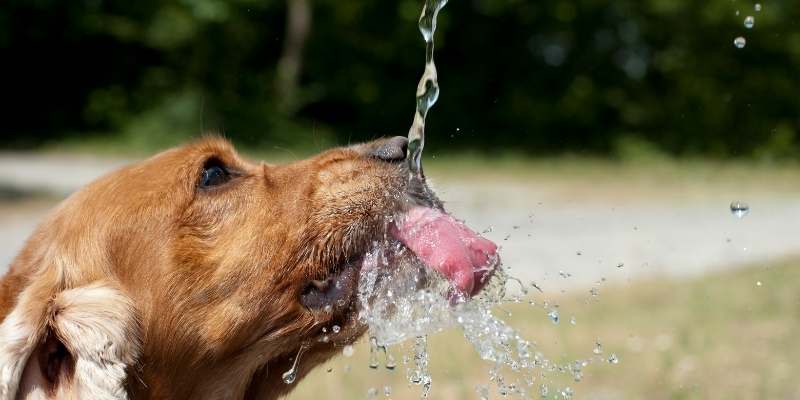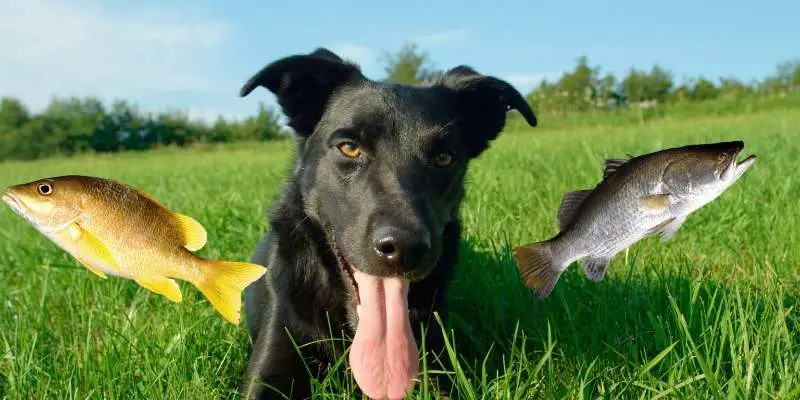Dogs aren’t exactly known for their impeccable dental hygiene or fresh breath. However, there is a significant difference between normal canine breath and the powerful, sour aromas that remind their owners of rotting fish or even feces.
Even if your dog receives regular dental treatment, foul breath is possible. When dental care is missing, odors can soon become more severe. Whether you’ve just noticed your dog’s foul breath or a chronic, years-long issue, pet owners may address it by identifying the root cause. And then taking steps to cure and minimize the odors. And that’s what this article is about.
Do you have a specific question about the subject? Then use the table of contents below to jump to the most relevant section. And you can always go back by clicking on the black arrow in the right bottom corner of the page. Also, please note that some of the links in this article may be affiliate links. For more details, check the Disclosure section at the bottom of the page.
Here's what we'll cover:
Is fishy breath in dogs a sign of illness?
Bad breath (also known as halitosis) is something we’ve all experienced. It occurs when we don’t brush our teeth frequently enough or when we eat that final piece of anchovy pizza before night. Halitosis happens when harmful bacteria accumulate in your mouth, lungs, or stomach, resulting in unpleasant foul odors to inhale. However, fishy breath in dogs is not always indicative of poor cleanliness. Here are some other reasons why your dog can smell fishy.
Digestive issues
Some dogs with stomach or digestive issues, such as gastroesophageal reflux, stomach ulcers, or hemorrhagic gastroenteritis, can have terrible breath. Vomiting can also leave you with bad breath.
Periodontal disease

Gingivitis is an inflammation of the gum tissue caused primarily by dental plaque. This causes gum swelling and redness, as well as poor breath. Plaque forms when bacteria in the mouth combine with proteins and carbohydrates in saliva. This mixture generates plaque that sticks to the teeth. Plaque eventually hardens into tartar, which is permanently adhered to the teeth. It is most noticeable immediately beneath the gum line, where it accumulates. Many periodontal disorders such as gingivitis can easily be avoided with regular cleaning, tooth brushing, and dental treatment.
Halitosis
Plaque and tartar buildup on your dog’s teeth can cause bad breath, often known as halitosis. Without your pet eating any fish, the odor may imitate that of fish.
Anal scent glands
If your dog has a fishy stench, the most likely cause is that the anal glands have become clogged and must be released. The anal sacs are pea-sized and located on both sides of the inside of your dog’s rectum. These sacs contain an oily material that is excreted by your dog. It indicates to other canines and animals that you have territory, are ready to mate, etc.
As you may have noticed, a “clogged” system causes a dog’s rear to scoot on the ground. The glands must be freed, which is done by the veterinarian or most groomers. You can also learn how to complete this basic task by asking us for help.
Diabetes
Diabetes is another illness that can generate an odd mouth odor. Diabetic ketoacidosis, a severe form of uncontrolled diabetes, can cause a peculiar sweet, fruity scent.
Tooth root abscess
Bad breath might be caused by an abscessed tooth in your dog’s mouth. Some tooth root abscesses are restricted within the mouth, whereas others spread to the skin. Owners frequently take their dogs to the veterinarian to immediately treat swelling on the cheek below the eye. A sedated oral examination or examination of this wound may reveal an abscessed tooth.
Treatment options include tooth extraction (removal) or root canal therapy. Depending on the severity of the illness, your veterinarian will most likely prescribe antibiotics and pain medicine when the tooth is treated. Remember to have your dog’s teeth checked and cleaned regularly. Oral hygiene is critical for avoiding foul breath and other significant issues.
Cancers
Foul breath can be caused by cancers of the throat, mouth, lungs, or nose.
Liver illness
Dimethyl sulfide buildup induced by liver disease might result in a sweet, musty breath.
Suppose your dog’s poor breath is caused by a major underlying health problem like these. In that case, they will almost certainly require serious medical attention.
Dog fishy breath means kidney disease?
A decrease in kidney function can cause some dogs’ breath to smell like ammonia or urine.
Other possible causes of your dog’s stinky breath
Other factors may contribute to a dog’s breath smelling fishy – or just plain awful. If your dog’s breath smells bad, it could be due to improper grooming. It could also be related to the food of your pet.
How to stop my dogs breath from smelling like fish?
Depending on the condition, most reasons for foul breath can be easily remedied. Small breeds, once again, have the most problems with anal gland manifestations. Allow your groomer to handle this for you. It’s less expensive than a vet appointment, plus your dog gets a bath afterward to get rid of all the odors. That fish odor will go away once their glands are healthy.
Proactive measures are the best way to deal with dental hygiene issues. First, make it a habit to brush your dog’s teeth at least twice a week. Groomers can also assist you with this process. Give your dog a chew toy or rawhide in between tooth brushing sessions. According to WebMD, the mechanical action of the friction scrapes away tartar by 70%.
If the problem is more serious, contact a veterinarian right once. Once your vet has diagnosed the problem, they can advise you on what doggie lifestyle modifications you should make. Suppose your dog’s breath smells like fish due to gastrointestinal issues or other internal organ problems. In that case, more harsh measures may be required. All of this is avoidable with proper pet care.
If you’ve tried everything else, it’s most likely his cuisine. Consult your veterinarian about the finest high-quality food to feed your dog. The rotational diet is recommended by Splash and Dash. This diet includes kibble, fresh, raw, and canned foods as nutrient sources. Larger kibble dog diets also encourage chewing, which aids in plaque removal. The general guideline is that the more protein you consume, the better. Cheap dog feeds contain fillers and other hazardous additives that may cause your dog’s breath to smell like fish and fail to provide appropriate nourishment.
Aside from the methods listed above, additional water additives and minty dog chews can help eliminate bad breath. We hope your dog’s breath improves, so you won’t be disgusted when they try to kiss you on the lips with their tongue!
Home remedies for fishy dog breath
Let’s say you’ve ruled out any medical illnesses that could be causing your dog’s fishy breath. Then it’s time for some simple home treatments you could attempt to remedy the problem.
Aloe Vera
Do you have a window sill aloe vera plant? If not, now is the time to get one. Aloe vera has anti-inflammatory, antibacterial, and antifungal characteristics that are beneficial to both you and your pets, and it is simple to apply. Simply cut a tip of the thick leaves and apply the gel-like fluid inside to soothe and treat burns, bug bites, minor cuts, dermatitis, and even acne.
Aloe vera gel is also effective for dogs’ skin problems, such as itching and hot spots. Aloe may also be beneficial in treating GI-tract issues that contribute to smelly breath.
“Aloe vera has enzymes that assist cleanse and repairing the digestive system,” Devereaux explains. “It also has antibacterial properties, making it an excellent oral cleaner.”
If you wish to utilize aloe vera for digestive disorders, ask your veterinarian for a recommendation. Then, apply the gel directly to your pup’s canines, particularly shortly before bed, to help release plaque.
Crunchy treats
Apples are a healthy and crunchy treat, but be sure there are no seeds! – and carrots make excellent dog goodies. They can also aid in the removal of tartar and germs from the teeth, which causes bad breath.
Daily portions of these or other crunchy, dog-friendly snacks may be enough to keep your dog’s pearly whites in good condition!
Peppermint and parsley

People frequently use peppermint to freshen their breath after a meal or before a significant date. It can deliver the same advantages to your dog.
“In its natural state, it can help soothe gastric trouble and relax the digestive tract and be rich in antioxidants that may help fight bad breath,” Devereaux explains.
She also suggests using organic, locally sourced mint wherever possible. You may give other drops to your dogs, such as Natural Breath Drops for Pets with Chlorophyll & Peppermint Essential Oil, or place them on treats or in a water dish. Why not plant some yourself, given how simple it is to grow indoors and outdoors? You’ll have a continual supply of Rover’s breath — and your mojitos!
Parsley works similarly to mint in that its fresh flavor deodorizes stinky breath. At the same time, its gorgeous bright-green hue signals the presence of chlorophyll. This powerful bacteria-fighting ingredient will rid your home of dog bad breath.
(Parsley and chlorophyll are also present in our Bye, Bye Dog Breath Dental Sticks.)
Add dried peppermint or parsley to your dog’s food, or brew a tea with either herb and incorporate it into the meal. Avoid using peppermint essential oil, one of many essential oils that are poisonous to dogs.
Probiotics
While bacteria are responsible for your dog’s bad breath, there are also healthy bacteria! Some of those beneficial bacteria are probiotics.
We also have these! They’re necessary for breaking down food in our digestive tracts, and when they’re out of balance, they can throw everything out of whack. The same is true for our four-legged buddies.
However, make sure that the probiotics you get for them are designed for dogs.
Fresh water

Speaking of water, did you know that your dog’s water dish is a breeding ground for hazardous bacteria? It may be absurd to wash and dry the dish before refilling it with fresh water, but this is exactly what you need to do daily to prevent bacteria buildup.
If you drink filtered water, you should definitely provide it to your pets. However, tap water may be contaminated, and bottled water is an expensive environmental nightmare. Instead, invest in a faucet-mounted filter or a filter pitcher, and remember to change the filters regularly.
Coconut oil
Is there anything that coconut oil cannot do? Obviously, the answer is yes, yet it serves a purpose in this case.
Coconut oil inhibits the growth of dangerous germs and plaque. It also helps to prevent tooth decay and gum disease. It’s almost as if it was explicitly designed for oral hygiene!
Coconut oil can also be beneficial to your teeth, so share some with your dog to ensure that you both have beautiful, healthy teeth!
Why does my dog smell like a fish?
Unfortunately, if the fish smell is strong and appears to come from the entire dog, including its breath, affected anal glands are likely to be the culprit. If you notice your dog doing the scoot, it’s time to take him to the vet. Suppose the fish smell is only noticeable when it licks your face. In that case, we recommend analyzing the food’s contents for omega fats.
If you still can’t explain the odor, get a dental cleaning to make sure there isn’t an infection in your mouth. Crunchy kibble is far better for your dog’s teeth than canned food and can help prevent halitosis and slow dental damage.
Thanks for the blog graphics: Canva.com

Thanks for the blog graphics: Canva.com
Doghint.com is a participant of several affiliate programs. The list includes (but not limited to) the following: VigLink, Refersion, ShareASale, and Amazon Services LLC Associates Program, an affiliate advertising program designed to provide a mean for us to earn fees by linking to Amazon.com and affiliated sites. Doghint.com does not intend to provide veterinary advice. All published articles are meant for informational purposes only and not substitute the professional veterinary consultation.


